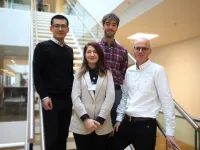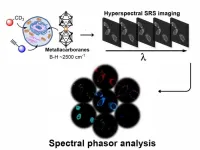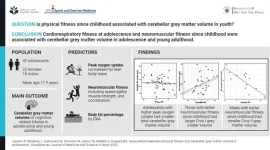(Press-News.org) Production of biological substances for medicine using genetically engineered yeast cells shows new promising results in basic research from an international team of researchers. In 2022, the researchers attracted international attention by programming the longest-ever biosynthetic pathway - or 'assembly line' - into a microbial cell factory and designing it to produce biological substances for cancer drugs.
In an article published in the scientific journal Nature Chemical Biology, Biosynthesis of natural and halogenated plant monoterpene indole alkaloids in yeast, the researchers now present results with the artificial production of the naturally occurring substance, alstonine, which has shown promising results for use in treating mental disorders.
"Development of medicines from natural plant substances is widely used. However, since plants do not produce these substances to fight human diseases, there is often a need to modify them to make them more effective and safe," says Michael Krogh Jensen, a senior researcher at DTU Biosustain and co-founder of the biotech company Biomia.
The researchers hope that the yeast platform can play a prominent role in discovering and developing plant-based medicine.
Fewer side effects for patients
The new research results prove that the engineered yeast cells can make other substances in the group of alkaloids than the substance vinblastine, for which the researchers presented results in 2022. In addition to producing the two new natural plant substances, alstonine and serpentine, the researchers have further developed the method to make 19 new derived variants of the two substances through a chemical process called halogenation, often used in medicine development. Today, up to 40 percent of the substances tested in human trials are produced by halogenation.
"We have found a method to make yeast cells use enzymes and carry out the same chemical process that takes place in halogenation. Plants generally can't naturally carry out halogenation. Therefore, our versatile biotechnological platform is a possible method for optimizing and developing plant-based alkaloids that may then be used to make medicines against, for example, schizophrenia, for which there are many negative side effects such as insomnia, weight gain and reduced immunity, when using existing medicines" says Michael Krogh Jensen.
The researchers created the yeast-based cell factories by inserting a large number of genes from plants that can generate biosynthesis of natural plant substances. In addition, they inserted enzymes from bacteria to halogenate these natural substances and tested the production in yeast. Following the conversion into serpentine and alstonine, the substances were purified. The researchers then tested their structure - using an NMR analysis (Nuclear Magnetic Resonance spectroscopy), which looks at the composition of atoms - and investigated their bioactivity in a cell line from monkeys.
Tested in human trials
The researchers have filed a patent application for the manufacture of the chemistry involved and established the company Biomia, which has a license to the patent portfolio that protects the manufacturing method. For drug discovery within part of the chemistry that the researchers presented in their Nature article from 2022 and this new study, Biomia raised 3 million USD in September 2023.
The research into the new yeast-based production of the halogenated plant-inspired natural substances and the 19 variants is still in an early phase, where the researchers are now finding the best candidates to use in treating mental disorders. The candidates must then be prepared for testing in clinical studies. At best, Michael Krogh Jensen expects to be able to send substances derived from alstonine to clinical trials in 2026.
Even if the clinical studies show promising results against schizophrenia or other mental disorders, it will still be at least ten years before the research may lead to new medicines for purchase at pharmacies.
END
Yeast cells can produce drugs for treatment of psychotic disorders
An international team of researchers has demonstrated that genetically engineered yeast cells can produce the natural plant product alstonine, which has shown positive effects in treating schizophrenia.
2023-11-10
ELSE PRESS RELEASES FROM THIS DATE:
New work sheds light on inner working of cells
2023-11-10
CÚRAM researchers at University of Galway, together with colleagues at the Centre for Molecular Nanometrology at University of Strathclyde have published work unveiling the inner workings of cells.
Published recently in the German scientific journal Angewandte Chemie, the work provides a deeper understanding of the way components within cells are interconnected. This research has been on the agenda of scientists worldwide for many years, and has yielded plenty of useful information on how certain diseases behave.
Through cellular visualisation using SRS microscopy, ...
Stable and efficient robotic artificial muscles built upon new material combinations
2023-11-10
Actuators, which convert electrical energy into motion or force, play a pivotal role in daily life, albeit often going unnoticed. Soft material-based actuators, in particular, have gained scientific attention in recent years due to their lightweight, quiet operation, and biodegradability. A straightforward approach to creating soft actuators involves employing multi-material structures, such as "pockets" made of flexible plastic films filled with oils and coated with conductive plastics. When subjected to electrical activation, the film displaces the fluid and contracts the pocket, similar to a biological muscle. This system ...
Initial patient dosed in Phase 2a clinical trial evaluating first-in-class human milk-based therapy in patients undergoing stem cell transplantation for blood cancers
2023-11-10
DUARTE, Calif., Nov. 10, 2023 – In a breakthrough for human milk science, researchers at City of Hope, Los Angeles, have dosed the first patient in a Phase 2a clinical trial evaluating a novel therapy for blood cancer patients undergoing allogeneic hematopoietic stem cell transplantation. The investigational treatment, PBCLN-010 in combination with PBCLN-014, combines human milk sugars with a strain of bacteria found in the gut of nursing infants.
“Previous clinical trials of PBCLN-010 + PBCLN-014 have shown that it can safely and predictably control the gut microbiome ...
UVA launches futures initiative to chart next decade in higher ed
2023-11-10
With an eye toward a decade ahead that promises change, opportunity, and challenge, the University of Virginia on Friday launched its Futures Initiative to help plan for the next 10 years in higher education.
Over the next year, a group of thought leaders from across the University, known as the Futures Initiative Group, will examine the current drivers of change in academia, such as artificial intelligence and large language models like ChatGPT, while also looking ahead to the eventual impact of sensor technology, virtual classrooms, the Internet of Things, and myriad other technological changes.
The goal of the initiative—which was announced at Datapalooza 2023, an annual event ...
Regenstrief, IMIA, IAHSI and AMIA hosting mini-summit at AMIA 2023 Annual Symposium to address health effects of climate change
2023-11-10
INDIANAPOLIS -- Regenstrief Institute, the International Medical Informatics Association (IMIA), the International Academy of Health Sciences Informatics (IAHSI) and the American Medical Informatics Association (AMIA) are hosting a mini-summit at the AMIA 2023 Annual Symposium to address how informatics can help resolve health issues caused by climate change. The event will bring together national and international experts to form an informatics infrastructure that will highlight and bring exposure to climate change's effects on health.
The event Mini-Summit 2023 -- Climate and health: How can informatics help? was planned because of the growing awareness around ...
Howard Meyers establishes Meyers Institute for Oncology Nursing with $25 million gift to MD Anderson
2023-11-10
HOUSTON ― Howard Meyers, of Dallas, Texas, a member of The University of Texas MD Anderson Cancer Center Board of Visitors (BOV), has committed $25 million to The University of Texas MD Anderson Cancer Center to establish the Meyers Institute for Oncology Nursing. The first of its kind, the Meyers Institute for Oncology Nursing will support and develop nurses throughout their careers by providing educational, professional and wellness-based resources tailored to cancer care nurses and nurse scientists. This ...
Clinical trial in pregnant women addresses detection of heart disorder in the fetus
2023-11-10
Some individuals with anti-Ro/SSA antibodies (anti–Sjögren's-syndrome–related antigen A autoantibodies, also called anti-Ro antibodies) have autoimmune diseases such as lupus or Sjögren's syndrome, but many have no symptoms. A clinical trial published in Arthritis & Rheumatology found that high levels of these antibodies in pregnant women are associated with fetal atrioventricular block (AVB), which occurs when inflammation and subsequent scarring prevent electric signals from the heart’s atria from reaching the ventricles. The disease ...
Trial generates promising results for obinutuzumab in patients with lupus nephritis
2023-11-10
In a post hoc analysis of the phase 2 NOBILITY trial, researchers found that treatment with obinutuzumab—an antibody that targets a protein expressed on certain immune cells—was superior to placebo for preserving kidney function and preventing flares in patients with lupus nephritis, a kidney condition associated with the autoimmune disease lupus.
In the analysis, which is published in Arthritis & Rheumatology, compared with standard-of-care treatment alone, the addition of obinutuzumab to lupus nephritis treatment reduced the risk of developing a composite outcome of death, fall in kidney function, or treatment failure by 60%. Adding obinutuzumab ...
Leading cardiologists reveal new heart disease risk calculator
2023-11-10
Statement Highlights:
The new American Heart Association PREVENTTM risk calculator estimates the 10- and 30-year risk of total cardiovascular disease for people aged 30 years and older.
The calculator estimates the risk of heart attack, stroke and — for the first time — heart failure. The equations are sex-specific and race-free, acknowledging that race is not a biological factor, and can include an index of social determinants of health.
This is the first risk calculator that combines measures of cardiovascular, kidney ...
Physical fitness since childhood predicts cerebellar volume in adolescence
2023-11-10
Physical fitness since childhood is associated with cerebellar grey matter volume in adolescents. According to a recent study conducted at the University of Jyväskylä and the University of Eastern Finland, those who were stronger, faster and more agile, in other words, had better neuromuscular fitness since childhood, had larger Crus I grey matter volume in adolescence.
Despite the importance of the developing cerebellum on cognition and learning, the associations between physical fitness and cerebellar volume in adolescents have remained unclear. This study examined the associations ...
LAST 30 PRESS RELEASES:
Medicare patients get different stroke care depending on plan, analysis reveals
Polyploidy-induced senescence may drive aging, tissue repair, and cancer risk
Study shows that treating patients with lifestyle medicine may help reduce clinician burnout
Experimental and numerical framework for acoustic streaming prediction in mid-air phased arrays
Ancestral motif enables broad DNA binding by NIN, a master regulator of rhizobial symbiosis
Macrophage immune cells need constant reminders to retain memories of prior infections
Ultra-endurance running may accelerate aging and breakdown of red blood cells
Ancient mind-body practice proven to lower blood pressure in clinical trial
SwRI to create advanced Product Lifecycle Management system for the Air Force
Natural selection operates on multiple levels, comprehensive review of scientific studies shows
Developing a national research program on liquid metals for fusion
AI-powered ECG could help guide lifelong heart monitoring for patients with repaired tetralogy of fallot
Global shark bites return to average in 2025, with a smaller proportion in the United States
Millions are unaware of heart risks that don’t start in the heart
What freezing plants in blocks of ice can tell us about the future of Svalbard’s plant communities
A new vascularized tissueoid-on-a-chip model for liver regeneration and transplant rejection
Augmented reality menus may help restaurants attract more customers, improve brand perceptions
Power grids to epidemics: study shows small patterns trigger systemic failures
Computational insights into the interactions of andrographolide derivative SRJ09 with histone deacetylase for the management of beta thalassemia
A genetic brake that forms our muscles
CHEST announces first class of certified critical care advanced practice providers awarded CCAPP Designation
Jeonbuk National University researchers develop an innovative prussian-blue based electrode for effective and efficient cesium removal
Self-organization of cell-sized chiral rotating actin rings driven by a chiral myosin
Report: US history polarizes generations, but has potential to unite
Tiny bubbles, big breakthrough: Cracking cancer’s “fortress”
A biological material that becomes stronger when wet could replace plastics
Glacial feast: Seals caught closer to glaciers had fuller stomachs
Get the picture? High-tech, low-cost lens focuses on global consumer markets
Antimicrobial resistance in foodborne bacteria remains a public health concern in Europe
Safer batteries for storing energy at massive scale
[Press-News.org] Yeast cells can produce drugs for treatment of psychotic disordersAn international team of researchers has demonstrated that genetically engineered yeast cells can produce the natural plant product alstonine, which has shown positive effects in treating schizophrenia.




